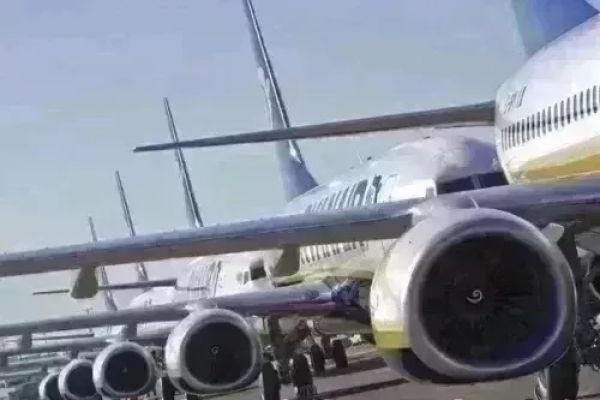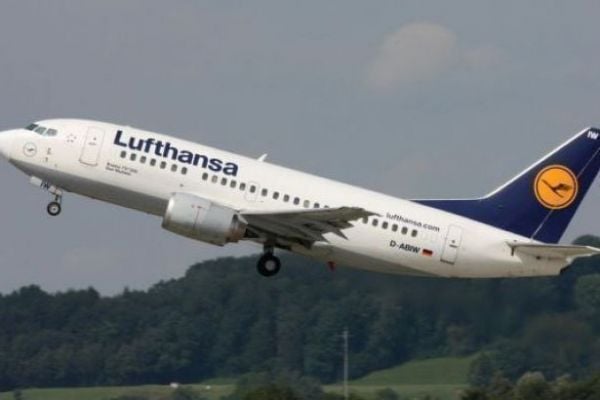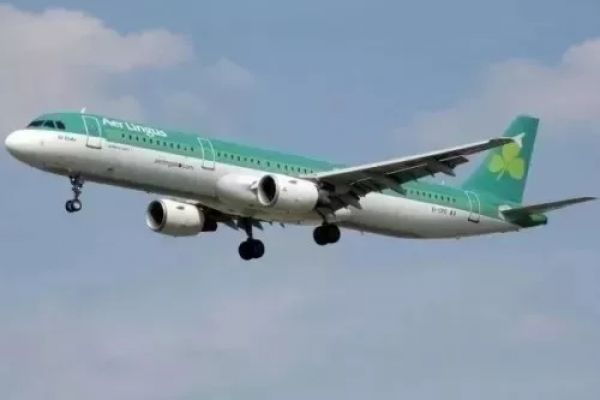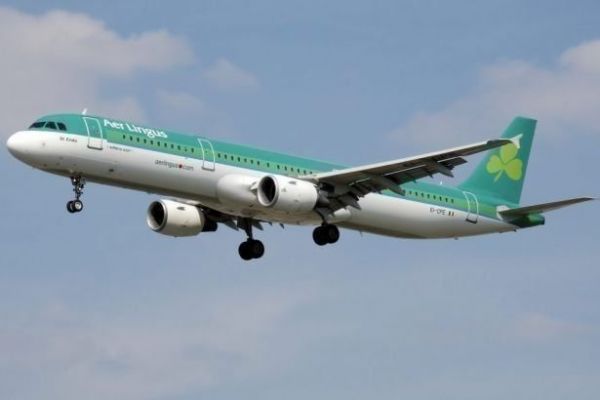Hospitality Ireland presents a round-up of global airline, travel and aviation news.
British Airways Says Short-Haul Flights From Gatwick To Start By March End
British Airways' short-haul flights from London's Gatwick airport will start by March end, with an initial plan to fly to 35 destinations, the airline said on Tuesday December 14.
The airline had in August announced its intention to create a short-haul standalone business at Gatwick, similar to its operation from London City Airport, which works under the British Airways name but exists as an entirely separate entity.
The company, owned by London-listed IAG, said tickets to the destinations would be on sale from Tuesday.
The airline will operate three Airbus aircraft to kick off the operations, with an aim to ramp up the fleet to up to 18 aircraft by the end of May.
The new unit's operations will herald the airline's return to short-haul flying from the London airport, which was suspended in the wake of COVID-19 pandemic in the spring of 2020.
The recovery at British Airways, typically IAG's most profitable airline, has fallen behind the group's Spanish units, Iberia and Vueling, as Britain steered through tougher and longer restrictions than Europe.
UK SET TO DROP ALL 11 COUNTRIES FROM CORONAVIRUS TRAVEL RED LIST- FT
BRIEF-UK Set To Drop All 11 Countries From Coronavirus Travel Red List- FT
* UK SET TO DROP ALL 11 COUNTRIES FROM CORONAVIRUS TRAVEL RED LIST- FT
SOUTHWEST AIRLINES ORDERS 7 BOEING 737 MAX JETS
Boeing Delivers 34 Aircraft In November, Picks Up Southwest Order
Boeing Co said on Tuesday December 14 that it handed over 34 airplanes to carriers in November, while adding 109 jets to its 737 MAX order tally.
The delivery tally - closely scrutinized by investors as deliveries generate much-needed cash during the coronavirus crisis - compares with 27 planes in October, and seven in the year ago period when Boeing was in the throes of the 737 MAX safety crises.
Again in November, Boeing failed to deliver its advanced carbon-composite 787 Dreamliner, which remains mired in inspections and retrofits likely to keep the jets sidelined until April 2022.
Of the 34 aircraft delivered last month, 28 were 737 MAX planes - 10 of which were for European low-cost carrier Ryanair. Boeing also turned over one P-8 maritime patrol aircraft to Norway, Boeing said.
The remaining jets were larger widebodies: one 767 apiece for FedEx Corp and United Parcel Service, one 747-8 for the Egyptian defense ministry, and two 767 tankers for the U.S. Air Force, Boeing said.
During the pandemic, many airlines have been forced to idle unused passenger jets, driving up demand for cargo space on dedicated freighters at a time when e-commerce has been a lifeline for many.
This year through November, Boeing has delivered 302 aircraft, more than twice the 118 aircraft it delivered in the first 11 months of 2020.
Boeing had 91 orders for aircraft in November, after cancellations and instances where a buyer converted an order for one type of aircraft to another.
It had 109 gross orders, all of which were for its 737 MAX jetliner, which returned to service in late 2020 after a near two-year safety ban.
That includes an order for 72 MAX jets from India's Akasa Air, a deal valued at nearly $9 billion at list prices that could help the U.S. planemaker regain lost ground in one of the world's most promising markets.
It also included an order for 30 737 MAX jets for Miami-based 777 Partners, which owns Canadian low-cost carrier Flair Airlines, and a previously undisclosed order for seven 737 MAXs for Southwest Airlines.
At the same time, buyers canceled orders for 18 737 MAX jets.
Gross orders for the year increased from 720 to 829, or from 373 to 457 after cancellations, conversions and stricter accounting standards were applied, Boeing said.
U.S. Appeals Court Declines To Block United Airlines Vaccine Mandate
A divided U.S. appeals court has rebuffed a request by six employees to block United Airlines from enforcing a COVID-19 vaccine mandate for workers that imposes unpaid leave on those who are granted religious or medical exceptions.
A panel of the New Orleans-based 5th U.S. Circuit Court of Appeals voted 2-1 on Monday December 13 night to reject the emergency request for an injunction blocking the mandate while the employees appeal a November ruling by a federal judge in favor of the airline.
The case is one of many legal battles over vaccine requirements imposed by companies and governments.
United Airlines was the first major air carrier to issue a vaccine requirement and others followed. United has granted around 2,000 religious and medical exemptions to employees in roles including pilots, flight attendants and customer service agents.
A United spokesperson declined to comment on the 5th Circuit decision.
The dissenting member of the three-judge panel, Judge James Ho, sharply criticized the decision, writing that "vaccine mandates like the one United is attempting to impose here present a crisis of conscience for many people of faith."
"To hypothesize that the earthly reward of monetary damages could compensate for these profound challenges of faith is to misunderstand the entire nature of religious conviction at its most foundational level. And that is so whether the mandate comes from D.C. or the C-Suite," added Ho, who was appointed to the bench by Republican former President Donald Trump.
The 5th Circuit panel's majority issued a two-sentence order rebuffing the plaintiffs, citing the rationale made by U.S. District Judge Mark Pittman in Texas last month.
Pittman rejected arguments by the employees that United improperly put them in an "impossible position" by forcing them to choose to receive a vaccine or face unpaid leave. Pittman was critical of United's approach toward employees seeking religious exemptions, but said in the end that human resources policy is up to a company and no employee was forced to be vaccinated.
The plaintiffs in the case asserted religious objections to the vaccine. The six employees accused the company of employment discrimination and retaliation, saying the airline violated a section of the Civil Rights Act of 1964 by failing to provide reasonable religious accommodations.
Vaccine mandates have become a flashpoint in the United States, with many conservatives opposed. These mandates have generally been upheld by courts, but White House efforts to require large employers or federal contractors to set vaccine or testing requirements have been blocked by courts.
United said allowing unvaccinated employees in the workplace would undermine the safety of its flights amid the COVID-19 pandemic. Pittman noted that the company acknowledged there was almost no chance of COVID-19 outbreaks on its planes.
The U.S. Supreme Court on Monday December 13 rejected challenges brought by a group of Christian doctors and nurses and an organization that promotes vaccine skepticism to New York's refusal to allow religious exemptions to the state's mandate that healthcare workers be vaccinated against COVID-19.
Investors Challenge Budget Airline Wizz Air Over Labour Rights
A group of 14 investors have called on budget airline Wizz Air to allow its staff to form and join trade unions amid concerns the company was "actively" discouraging the practice and breaching their human rights.
The group, including Denmark's AkademikerPension and Britain's Ardevora Asset Management, said the freedom to unionise was enshrined in a range of global and regional conventions and laws, but their research suggested a pattern of behaviour at the company to block employees doing so.
Wizz Air did not respond to a request for comment.
The letter, seen by Reuters, highlighted six examples dating back to 2014, when a Romanian court fined the company after 19 employees were dismissed shortly after starting a union.
More recently, in June 2020, the investors' letter quoted an interview with Chief Executive Jozsef Varadi in which he said the company was "keeping out unions everywhere" as they were "killing the business".
In April 2021, meanwhile, Wizz Air rejected calls from unions in Italy to agree a labour contract with them and told the country's labour ministry it planned to operate without engaging with unions.
"Respect for workers' rights is ultimately about caring about the safety of passengers," said Jens Munch Holst, chief executive of AkademikerPension, a $23 billion Danish pension fund.
"There is a growing body of evidence of workers being blocked to join unions or sacked when they do so. This is completely unacceptable."
While acknowledging that the company sought to manage labour relations through an internal body known as the Wizz People Council, the investors said they were concerned about its effectiveness in communicating staff concerns to management.
Specifically, the investors pointed to a recent whistleblower report flagging concerns around pilot fatigue and flight safety.
"Recognising workers' freedom to form and join unions is not only a legal and moral responsibility of the employer, but also an important risk mitigation strategy," the letter said.
"To remedy our concerns, we therefore encourage Wizz Air to publicly and formally recognise employees' rights to form and join unions; and commit to non-discrimination on the basis of union membership."
AkademikerPension's Holst said if the board refused to act, his fund would ditch its stake.
"If the company remains unresponsive, and fails to formally recognise unions, our only option is to divest our holdings and place the company on our exclusion list.
"Our message is clear to the company. We will wait until 20 December and if our meeting requests are not met, expect exclusion."
Singapore Airlines In Provisional Deal For Seven A350 Freighters
Singapore Airlines Ltd (SIA) has signed a provisional agreement to buy seven Airbus SE A350 freighters in a deal that would make it the first airline to operate the new model, it said on Wednesday December 15.
The letter of intent for deliveries from the fourth quarter of 2025 includes a swap with 15 A320neos and two A350-900 passenger planes in its order book, the airline said in a statement.
Those planes had a list value of $2.3 billion when Airbus last published prices in 2018, roughly the same price as seven A350-900 passenger planes at the time, making it unclear how much incremental revenue the planemaker will get from the deal.
The deal with one of Asia's major carriers is nonetheless a significant boost for Airbus' efforts to penetrate a cargo market long dominated by its U.S. rival.
Reuters reported in November that Airbus hoped to land a freighter deal with SIA as Qatar Airways, embroiled in a row over surface damage to existing A350s, favoured a deal for Boeing 777X freighters.
SIA said the A350 freighters, along with options for another five, will replace its fleet of seven ageing Boeing Co 747 freighters and help the airline to reduce carbon emissions.
The airline is the third customer for the A350F after deals clinched with lessor Air Lease Corp and French cargo company CMA CGM.
"The selection of the A350F to replace the 747F is sensible as SIA already has the world's largest A350 passenger fleet, creating attractive synergies for its future cargo operation," said Brendan Sobie, an independent aviation analyst based in Singapore.
He said the conversion of 15 A320neo orders made sense because the airline had too many narrowbody planes on order for the post-pandemic environment.
Cargo accounted for two thirds of SIA's revenue in the six months to Sept. 30. The airline, which lacks a domestic market, has been hit hard by pandemic-related border closures.
SIA on Wednesday December 15 said it should reach 45% of pre-pandemic passenger capacity in December, up from an earlier estimate of 43% as Singapore gradually opens its borders. In November, it filled about a third of its passenger seats.
EU Extends Airport Slot Relief Through Summer 2022
The European Commission said on Wednesday December 15 it had extended its suspension of airport slot access rules until October 2022, providing relief for airlines still suffering from reduced traffic due to the COVID-19 pandemic.
The Commission said in a statement that the slot relief had been extended to the 2022 summer scheduling season running from March 28 to Oct. 29.
Airlines are normally required to use at least 80% of their take-off and landing windows or else cede some to rivals.
Instead, for the relief period, they will only have to use 64% to retain the rights to those slots.
The Commission said that air traffic had not fully recovered to 2019 levels, but reached more than 70% in summer 2021. Eurocontrol has estimated that annual air traffic in 2022 will be 89% of 2019 levels, according to its most likely case.
Transport Commissioner Adina Valean said the EU executive was monitoring the impact of the Omicron variant closely and had demonstrated throughout the pandemic that it could act swiftly if needed.
IAG CEO LUIS GALLEGO SAYS AIR EUROPA WAS IMPORTANT FROM STRATEGIC POINT OF VIEW, BUT CONDITIONS NOT FAVOURABLE NOW
IAG CEO LUIS GALLEGO SAYS WE ARE TRYING TO FIND NEW STRUCTURE FOR AIR EUROPA DEAL
IAG CEO LUIS GALLEGO SAYS SAYS WILL NOT PROVIDE MORE DETAILS ON AIR EUROPA THINKING
IAG Boss Seeks Alternatives As Air Europa Deal Hits The Skids
Airline group IAG is set to cancel its takeover of Air Europa after European regulators indicated they would not allow it to go through without further concessions, though CEO Luis Gallego hasn't given up hope of some sort of tie-up.
British Airways and Iberia owner IAG's proposed acquisition from privately held Spanish company Globalia was designed to help the group's Madrid hub to compete more effectively against its European rivals. Air Europa provides connections to Latin America as well as serving destinations in Europe.
After IAG finance chief Stephen Gunning announced that the group was in advanced negotiations to cancel the acquisition, Chief Executive Luis Gallego said the COVID-19 pandemic meant the deal no longer worked but that IAG was assessing whether there were other options for a tie-up.
"Air Europa, let's see if finally we can find a way to do it," he told the online Capa Live conference.
"We are not going to continue with the current structure, we are trying to have a new structure that (will) allow this deal to happen."
While most observers expected IAG to pull the deal once the pandemic struck, it instead agreed to cut the price in half to €500 million and negotiated to defer payments for six years.
European competition regulators, however, were concerned that the takeover would reduce competition in the Spanish domestic market and on international routes to the country.
The remedies offered by IAG - to give up 13 short and medium-haul routes and two long-haul routes at Madrid and Barcelona airports - were not enough to assuage the concerns and a veto was likely, sources have said.
As well as BA and Iberia, which is the market leader between Europe and South America, IAG also owns Irish carrier Aer Lingus and Barcelona-based Vueling and Level.
Shares in IAG fell 1.6% in early trading on Wednesday December 15, with Citi analysts saying they believed the decision to cancel the deal was widely expected, given the regulatory hurdles thrown in its path by the European Commission and the UK's Competition and Markets Authority (CMA).
By walking away before the deal is vetoed by regulators, IAG will be better positioned to make another attempt in the future, sources said.
News by Reuters, edited by Hospitality Ireland. Click subscribe to sign up for the Hospitality Ireland print edition.









